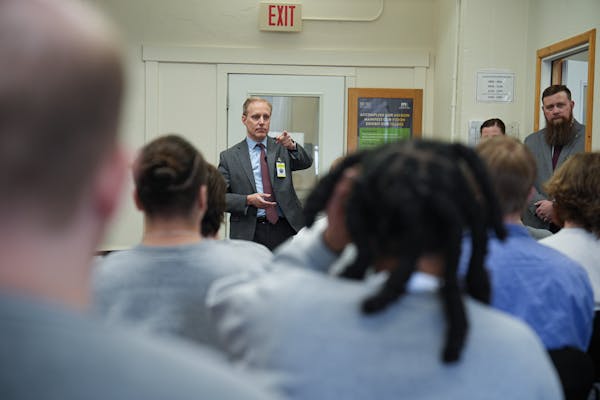The Minnesota Voters Alliance asked the state Supreme Court on Monday to reinstate its challenge to the year-old law restoring voting rights to felons when they are released from incarceration, a prospect that several justices questioned skeptically.
James Dickey of the conservative Upper Midwest Law Center, appearing for the nonprofit alliance, argued the new law is unconstitutional because the right to vote can be restored only as part of broader package of civil rights, not on its own. The other rights, he said, are the right to serve on a jury and hold office.
He argued that the Legislature exceeded its authority when it passed the law in 2023 without restoring other civil rights. Dickey said the court should reinstate the lawsuit dismissed by Anoka County Judge Thomas Lehmann late last year.
Earlier this year, the state Supreme Court took up the case on expedited review, bypassing the Court of Appeals. Arguing in defense of the new law, Assistant Attorney General Nathan Hartshorn asked the court to uphold Lehmann's dismissal and issue an opinion supporting the law.
Early voting in the state primary begins in late June, and Hartshorn said an estimated 57,000 felons are newly eligible to vote. Those Minnesotans "need to hear from this court whether they're taking their freedom into their hands by casting a ballot," he said.
The question of standing
Dickey argues that the Voter Alliance has legal standing to challenge the law because state taxpayer money is being used to support it. Hartshorn countered that wasn't enough. He said the alliance lacked standing because it offered no evidence that anyone had been harmed by the law.
Justice G. Barry Anderson started the questioning of Dickey by noting that spending for the new law — about $200,000 for education — was "very minor" in the broader state budget of more than $70 billion. Anderson pushed Dickey, asking if the Minnesota Voters Alliance has standing in this case, what would be a situation where someone wouldn't have standing?
Dickey said there would be no standing if a law didn't include discretionary spending.
Anderson responded, "It strikes me that your test is [that] if there's an expressed allocation of funds, then there's taxpayer standing."
Justice Anne McKeig asked Dickey, "Doesn't that seem overbroad?"
Dickey said no to McKeig's question. But Anderson said Dickey's definition of standing in Minnesota would be "substantially broader than the one that applies in federal court."
Chief Justice Natalie Hudson also pressed Dickey, saying the spending in this matter "seemed to be more tangential" than other cases where the court had upheld standing.
Hartshorn said that if the court adopted Dickey's position on standing, it would be an extreme expansion of Minnesota law.
New law education
Before last year, those who had been convicted of felonies couldn't vote until they were off probation and had paid all fines connected to their conviction. Under the new law, felons instantly become eligible upon release from prison.
The change had broad support among DFLers, including Attorney General Keith Ellison, who had been pushing it for two decades. Secretary of State Steve Simon has been conducting a statewide education campaign about the change.
Some Republicans, however, objected to the new law, saying it would disproportionately help DFL candidates. They also argued that losing the ability to vote was a consequence of breaking the law.
The legality of felon voting rights has been before the state Supreme Court prominently in recent years. In February 2023, the court said that barring felons from voting was constitutional. Even before the court ruling, legislators were moving to "Restore the Vote" and Gov. Tim Walz was supportive.
States vary widely in their approach to voting rights. In Maine, Vermont and the District of Columbia, felons never lose the right to vote even while incarcerated. In more than 20 states, including Minnesota, felons regain the right immediately on release, according to the National Conference of State Legislatures.
Hartshorn said the lawsuit itself had instilled "fear and uncertainty and doubt in tens of thousands of people" about whether they could vote. He said they need to hear from the state Supreme Court that "you have been re-enfranchised."
Justice Karl Procaccini asked Dickey whether voting rights restoration wasn't already part of a bundle of civil rights, including applying for an absentee ballot, filing a petition and seeking to recall an elected official. "We have a long history of not restoring all civil rights at the same time," Procaccini said. He pointed out that felons must petition the state to reclaim the right to carry guns.
Dickey said gun rights are unique, but that voting rights are packaged with two others: the right to run for office and serve on a jury.
Justice Margaret Chutich countered that there's "no constitutional prohibition to serving on a jury" and when the Minnesota Constitution was written, probation and supervised release didn't exist.
"It seems to me when people get out of prison, they get a lot of their rights back: They can travel, they can go to church," she said.
Procaccini asked Hartshorn whether it was illegal for government to spend money in support of an unconstitutional law. Hartshorn said, "I don't know."
Justice Gordon Moore asked Dickey whether elections held since the new law passed could be challenged if the court rules in favor of him. Dickey said no, the challenges would be too late now.
At the end, Hudson said the court would rule in due course. She didn't provide a time frame.
Former DFL Senate Majority Leader Kari Dziedzic dies of cancer at age 62

How the Star Tribune is covering the 2024 election

Fact check: Walz and Vance made questionable claims during only VP debate

In Tim Walz's home city, opposing groups watch him debate on the national stage

